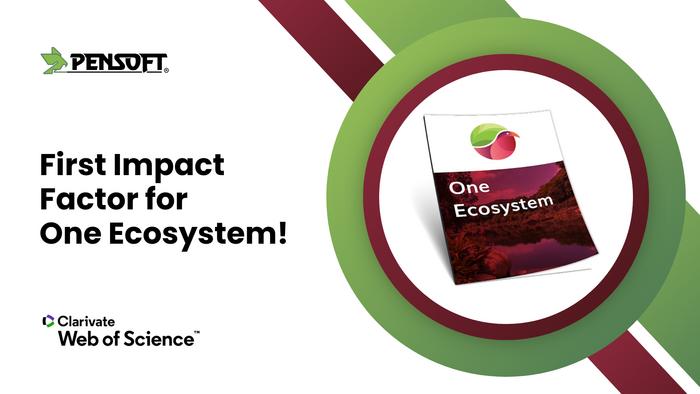For the first time, the Journal Citation Reports™ – released by Clarivate in late June 2024 – features the open-access scientific journal One Ecosystem. The inaugural Journal Impact Factor for One Ecosystem stands at 1.8.

Credit: Pensoft
For the first time, the Journal Citation Reports™ – released by Clarivate in late June 2024 – features the open-access scientific journal One Ecosystem. The inaugural Journal Impact Factor for One Ecosystem stands at 1.8.
The 2024 report reflects how many times content published in a particular journal in 2021 and 2022 was cited in the last complete year: 2023. Then, this total count is divided by the number of “citable” (i.e. research and review) articles to estimate the JIF for 2023.
The news comes shortly after the journal specialised in ecology and sustainability data received a Scopus CiteScore of 4.6. In comparison to Clarivate and the Journal Impact Factor, Scopus uses data from its own database and calculates its CiteScore based on publications and citations from the last four complete years.
One Ecosystem was launched in 2016 by open-access scholarly publisher and technology provider Pensoft in collaboration with Editor-in-Chief Prof. Dr. Benjamin Burkhard (Head of the Physical Geography & Landscape Ecology section at Leibniz University Hannover, Germany), and Deputy Editors-in-Chief Prof. Dr. Davide Geneletti (Department of Civil, Environmental and Mechanical Engineering, University of Trento, Italy) and Dr. Joachim Maes, (Directorate-General for Regional and Urban Policy of the European Commission). Since the beginning it has been associated with and endorsed by the global Ecosystem Services Partnership.
Amongst the unique features of the journal are the collaborative writing and review environment integrated within the manuscript submission workflow to allow for heavily automated structured data import; semantically enriched publications; and field-specific article formats, such as Ecosystem Service Mapping; Ecosystem Service Models; Ecosystem Accounting Table; Monitoring Schema.
“Since day one, One Ecosystem has been widely praised in the community for its novel and data-driven approach to ecology and sustainability science, coupled with a straight-forward and low-cost open-access scholarly publishing strategy for any researcher in the world. Now, the recognition by Web of Science and Scopus provides the journal with further proof of its top quality and research integrity that – I expect – will attract even more researchers in the field to submit their work to the journal”
says Editor-in-Chief Benjamin Burkhard.
Content published in One Ecosystem can be found in over 60 leading academic indexing databases, including Scopus, Research Gate, DOAJ, Cabell’s Directory, CABI, ERIH PLUS, CNKI, Unpaywall and OpenAIRE. It is also archived in CLOCKSS, Zenodo, Portico and Zendy.
***
Visit the One Ecosystem journal website at: https://oneecosystem.pensoft.net. You can also follow One Ecosystem on X (formerly Twitter) and Facebook.



